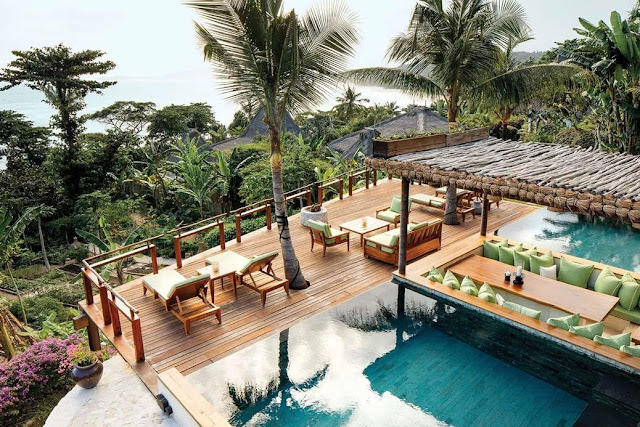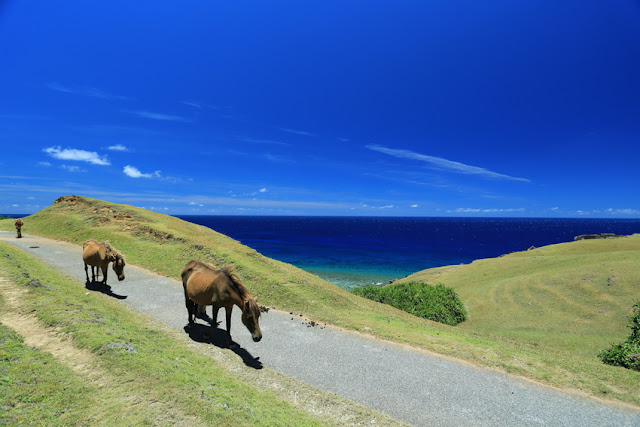 |
| Jeju in autumn |
Gapmajang Road
The mid-mountain region of Jeju Island was formed when lava flowing from the top of Hallasan Mountain at Baengnokdam crater down to the ocean hardened at locations along the way and ultimately formed a plain. This plain is known for its suitability for raising horses, and during the 100 years or so between 1794 and 1899, Jeju's horse culture developed substantially. This is especially the case for the region of Gasi-ri, Pyoseon-myeon, Seogwipo. It is also an area with an Olle walking trail and plenty of beautiful fields of spring wildflowers and autumn pampas grass.The area around the 2nd Sanrok Road south of Hallasan Mountain was appropriately named on the “100 Most Beautiful Roads in Korea” by the Ministry of Construction and Transportation. But you don’t have to see it only from a car. There are plenty of spots to hike and admire the mountain and ocean views. Bring friends, family, your significant other, and take pictures of the pristine scenery and majesty of Jeju’s natural environment.
Address: 3149-33beonji, Gasi-ri, Pyoseon-myeon, Seogwipo
Geumbaekjo Road
Here you can see magnificent vistas of pampas grass that wave high and low on the slopes of Jeju Island. This is a famous 10-kilometer-long highway leading northeast from Seogwipo City though to Susan-ri, Seongsan-eup. Along the way by car you will pass through pristine mid-mountain plains that by all accounts inspire a romantic mood in those who are fortunate enough to experience its winding roads and wonderful scenery.If you need to stop along Geumbaekjo Road, please look for a parking area or observation deck. This is the safest place to view the volcanic cones, coastline and forest of the south side of the island.
Address: Susan Eco Experience & Information Center, Susan-ri, Seongsan-eup, Seogwipo
Dalkmeoreu Coastal Path
The pampas grass growing along the northern coast at Sinchon-ri, Jocheon-eup, covers a hidden place with an unusual name. Dalkmeoreu Coastal Path gets its name from the shape of a geological formation that some say looks like a chicken sitting on the ground when viewed from a certain angle. The area is a well-known fishing spot and there is an eco-learning experience center on site. The coastal path has been designated an official “Korean Coast Stroll Pathway” by the Ministry of Maritime Affairs and Fisheries and the Korea Ocean Foundation. It was recognized as a natural, not artificial, creation which is both beautiful and full of marine culture and history.The path covers some 1.6 kilometers from Sinchon Port to Sinchon Village Diving Women Changing Area. The course is just a 30-minute walk, but during that short time you can take in the fullness of the autumn sky, sea, and sunset. Its panoramas and ocean waves crashing on the rocks make it one of the best date spots on the island. Naturally, since Jeju is an island it’s possible to view the ocean from every part of it, but it’s these sorts of quaint walking paths that offer visitors a distinctly local experience. How about giving this Dalkmeoreu Coastal Path a try?
Address: 2408-1 Sinchon-ri, Jocheon-eup, Jeju City
Ttarabi Oreum
Before you ascend this oreum in October or November, you’ll notice just how Ttarabi’s thick, swaying pampas grass has turned a beautiful, golden brown. Known as “the queen of Jeju oreum” its shape is delicate and graceful, giving off an aura of royalty. And not unlike a queen, it’s rather popular, so if you’d like to enjoy the view from the top in peace, it’s best to visit either early in the morning or at sunset. |
| Sunset in Ttarabi Oreum |
Address: San 62 Gasi-ri, Pyoseon-myeon, Seogwipo
Akkeundarangswi Oreum
Compared to Darangswi volcanic cone, the 10-minute climb to the summit of Akkeundarangswi is much easier (“akkeun” means “something that comes close”, or “small” in the Jeju language). Still, it affords hikers a remarkably beautiful view. The top of the oreum is devoid of trees and other structures, so it’s just you, the pampas grass, and the sky up there. You’ll be the recipient of the gift of a genuine Jeju autumn experience.Walking through the thick, golden-brown pampas grass, there are plenty of great photo ops. But be sure to wear long sleeved shirts, pants, and appropriate footwear for optimal comfort and safety. It can get quite cool and the path slippery if it rains. But don’t let that stop you from enjoying the charms of this volcanic cone. Pack a bottle of water and some snacks and head out for a beautiful day in Jeju’s great outdoors!
Address: 2593 Sehwa-ri, Gujwa-eup, Jeju City
Read more: Where to find the best delicacies in Jeju
Source Visit Jeju

















































